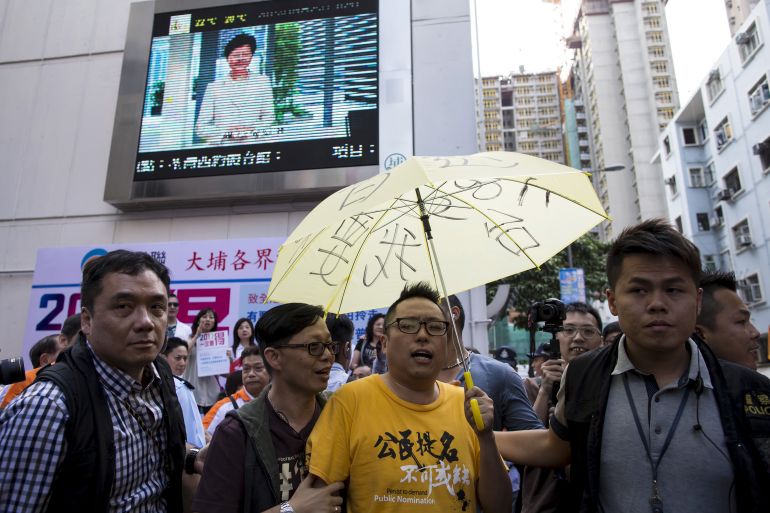Hong Kong pro-democracy DJ convicted for ‘seditious’ speech
Pro-democracy radio personality Tam Tak-chi is among a growing number of Hong Kong activists charged with colonial-era law.

In Hong Kong, a pro-democracy radio DJ has been convicted of seditious speech under a British colonial-era law as China flattens dissent in the business hub.
Tam Tak-chi’s trial on Wednesday was the first since 1997 in which a sedition defendant fought his case by pleading not guilty and going through a full trial.
Keep reading
list of 4 itemsLittle cheer for Year of the Tiger in Hong Kong as COVID bites
‘Assumed as criminals’: Hong Kong defendants find bail elusive
How a billionaire’s cruise empire imploded in Hong Kong
Tam, 49, is among a growing number of activists charged with sedition, a previously little-used law that prosecutors have dusted off in the wake of massive and sometimes violent pro-democracy protests in 2019.
Two recent prosecutions were wrapped up after guilty pleas.
As a result, Tam’s conviction is a legal watershed because it sets precedents for a host of upcoming sedition prosecutions as China remoulds Hong Kong in its own image.
Better known by his moniker “Fast Beat”, Tam hosted a popular online talk show that backed democracy and was highly critical of the government, often using colourful language.
He was a regular presence at protests and often set up street booths to deliver political speeches.
Prosecutors focused on the street booths, convicting Tam on seven counts of “uttering seditious words” as well as other charges such as disorderly conduct and disobeying a police officer.
‘Inciting hatred’
Authorities said Tam incited hatred against the authorities by chanting the popular protest slogan “Liberate Hong Kong, revolution of our times,” 171 times, cursing the police force some 120 times, and repeatedly shouting “Down with the Communist Party”.
“The attack on the Communist Party is only part of the seditious words uttered by the accused,” district judge Stanley Chan said in his verdict.
“Looking at what he (Tam) said, it’s far beyond criticising and theorising,” he added.
The law being used to prosecute “sedition” is separate from the sweeping national security law Beijing imposed on Hong Kong in 2020.
But courts treat it with the same severity and there are plans to make sedition one of a number of new national security crimes later this year, meaning it will soon carry a much longer jail term.
Tam, one of the increasing number of activists convicted in recent months, was arrested in September 2020 and denied bail, as happens in most national security cases.
His trial began in July 2021 but was delayed for a landmark High Court ruling in which judges declared the slogan “Liberate Hong Kong” was secessionist and therefore illegal under the new security law.
That ruling legally crystallised the reality that certain views and slogans are now forbidden in Hong Kong under the security law.
Meanwhile, a British human rights lawyer and former head of Hong Kong’s Bar Association said he left the city on Tuesday evening, hours after China’s state-backed media said he was summoned to a local police station and interviewed by national security police.
The Hong Kong-based Wen Wei Po reported that Paul Harris had been summoned to a police station in the city’s Wanchai district, with Harris purportedly shown walking into the police station in a video posted on its website.
Another state-backed newspaper, Ta Kung Pao, said in a separate report on Wednesday that Harris had “fled” Hong Kong after being called in to meet police for an “alleged violation” of the national security law.
Harris confirmed to the Reuters news agency in a phone message that he had left the city but gave no further details.